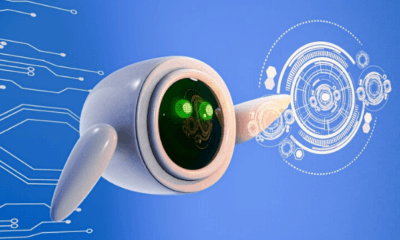AI
Why AI Should Not Be Banned: Harnessing the Potential
Businessreign.com
Artificial intelligence (AI) has become a hot topic in recent years, with some people calling for a complete ban on the technology. While there are certainly risks associated with AI, it is important to remember that it also has the potential to do a great deal of good. In this article, we will discuss some of the reasons why AI should not be banned, and how we can harness its potential to create a better future.
The Benefits of AI
AI has the potential to revolutionize many aspects of our lives, from healthcare to transportation to education. For example, AI can be used to develop new drugs and treatments, create self-driving cars, and personalize learning experiences. AI can also be used to automate tasks, which can free up human workers to focus on more creative and productive activities.
In addition to the economic benefits, AI can also have a positive impact on society. For example, AI can be used to combat climate change, improve public safety, and promote social justice.
The Risks of AI
Of course, there are also risks associated with AI. One of the biggest concerns is that AI could be used to develop autonomous weapons that could kill without human intervention. Another concern is that AI could lead to job losses, as machines become capable of doing many of the tasks that are currently done by humans.
There is also the potential for AI to be used for malicious purposes, such as spreading misinformation or manipulating elections. It is important to be aware of these risks and to take steps to mitigate them.
How to Harness the Potential of AI
Despite the risks, the potential benefits of AI far outweigh the risks. The key is to develop and use AI in a responsible and ethical manner. We need to ensure that AI systems are designed to benefit humanity and not harm it.
We also need to make sure that AI is accessible to everyone, not just a select few. This means investing in education and training, so that people have the skills they need to work with AI.
Finally, we need to develop strong governance frameworks for AI. This includes developing clear regulations and guidelines for the development and use of AI.
Conclusion
AI is a powerful tool that has the potential to change the world for the better. However, it is important to use AI responsibly and ethically. By working together, we can ensure that AI is used to benefit humanity and not harm it.
Additional Considerations
In addition to the points discussed above, it is also important to consider the following:
- The need for public dialogue and debate about AI.
- The importance of international cooperation on AI.
- The long-term implications of AI for humanity.
By taking all of these factors into account, we can develop a roadmap for the responsible development and use of AI.
About The Author
AI
Artificial Intelligence Debate: Exploring the Pros and Cons for Society

Businessreign.com – Artificial intelligence (AI) has revolutionized various aspects of our lives, from the smartphones we carry to the cars we drive. While AI has undoubtedly brought about significant advancements, it has also sparked a heated debate about its overall impact on humanity.
The Benefits of Artificial Intelligence
Proponents of AI highlight numerous advantages that this technology offers to society. These include:
- Enhanced Efficiency and Productivity: AI automates repetitive tasks, freeing up human workers to focus on more complex and creative endeavors. This automation streamlines processes, increases output, and reduces costs across various sectors.
- Improved Decision-Making: AI algorithms can analyze vast amounts of data to identify patterns, trends, and anomalies that humans might miss. This capability enables better-informed decisions in areas such as healthcare, finance, and risk assessment.
- Personalized Experiences: AI tailors products, services, and content to individual preferences and needs. This personalization enhances user experiences, improves customer satisfaction, and drives engagement.
- Advanced Scientific Research: AI accelerates scientific breakthroughs by analyzing complex data, generating hypotheses, and conducting simulations. This contribution drives progress in fields like medicine, materials science, and environmental research.
The Concerns Surrounding Artificial Intelligence
Despite its undeniable benefits, AI raises concerns that have fueled a debate about its overall impact on society. These concerns include:
- Job Displacement: AI automation raises fears of widespread job losses, particularly in industries reliant on repetitive tasks. This displacement could lead to economic hardship and social unrest.
- Algorithmic Bias: AI algorithms can perpetuate existing biases in the data they are trained on. This bias can lead to discriminatory outcomes in areas like hiring, loan applications, and criminal justice.
- Privacy and Security Risks: AI systems collect and analyze vast amounts of personal data, raising concerns about privacy breaches and misuse of information. This data can be exploited for surveillance, manipulation, and identity theft.
- Loss of Control and Ethical Dilemmas: The increasing sophistication of AI raises concerns about human control over these systems. Ethical dilemmas arise when AI makes decisions that have significant consequences for individuals and society.
Navigating the Future of AI
As AI continues to evolve, it is crucial to address both its potential benefits and its associated risks. Governments, businesses, and individuals must collaborate to ensure that AI is developed and used responsibly, ethically, and for the betterment of society.
Conclusion
AI is a powerful tool that has the potential to transform our world for the better. However, it is essential to approach AI with caution and foresight, ensuring that its development and application align with human values and societal well-being. By carefully navigating the pros and cons of AI, we can harness its power to create a future that benefits all of humanity
About The Author
AI
The Double-Edged Sword: Exploring the Pros and Cons of Artificial Intelligence

Businessreign.com – Artificial intelligence (AI) has permeated nearly every aspect of our lives, from the smartphones we carry to the cars we drive. While AI has undoubtedly brought about significant advancements, it has also sparked a heated debate about its overall impact on humanity.
The Benefits of Artificial Intelligence
Proponents of AI highlight numerous advantages that this technology offers to society. These include:
- Enhanced Efficiency and Productivity: AI automates repetitive tasks, freeing up human workers to focus on more complex and creative endeavors. This automation streamlines processes, increases output, and reduces costs across various sectors.
- Improved Decision-Making: AI algorithms can analyze vast amounts of data to identify patterns, trends, and anomalies that humans might miss. This capability enables better-informed decisions in areas such as healthcare, finance, and risk assessment.
- Personalized Experiences: AI tailors products, services, and content to individual preferences and needs. This personalization enhances user experiences, improves customer satisfaction, and drives engagement.
- Advanced Scientific Research: AI accelerates scientific breakthroughs by analyzing complex data, generating hypotheses, and conducting simulations. This contribution drives progress in fields like medicine, materials science, and environmental research.
The Concerns Surrounding Artificial Intelligence
Despite its undeniable benefits, AI raises concerns that have fueled a debate about its overall impact on society. These concerns include:
- Job Displacement: AI automation raises fears of widespread job losses, particularly in industries reliant on repetitive tasks. This displacement could lead to economic hardship and social unrest.
- Algorithmic Bias: AI algorithms can perpetuate existing biases in the data they are trained on. This bias can lead to discriminatory outcomes in areas like hiring, loan applications, and criminal justice.
- Privacy and Security Risks: AI systems collect and analyze vast amounts of personal data, raising concerns about privacy breaches and misuse of information. This data can be exploited for surveillance, manipulation, and identity theft.
- Loss of Control and Ethical Dilemmas: The increasing sophistication of AI raises concerns about human control over these systems. Ethical dilemmas arise when AI makes decisions that have significant consequences for individuals and society.
Navigating the Future of AI
As AI continues to evolve, it is crucial to address both its potential benefits and its associated risks. Governments, businesses, and individuals must collaborate to ensure that AI is developed and used responsibly, ethically, and for the betterment of society.
Conclusion
AI is a powerful tool that has the potential to transform our world for the better. However, it is essential to approach AI with caution and foresight, ensuring that its development and application align with human values and societal well-being. By carefully navigating the pros and cons of AI, we can harness its power to create a future that benefits all of humanity.
About The Author
AI
Artificial Intelligence Debate: Exploring the Pros and Cons for Society

Businessreign.com – Artificial intelligence (AI) has permeated nearly every aspect of our lives, from the smartphones we carry to the cars we drive. While AI has undoubtedly brought about significant advancements, it has also sparked a heated debate about its overall impact on humanity.
The Benefits of Artificial Intelligence
Proponents of AI highlight numerous advantages that this technology offers to society. These include:
- Enhanced Efficiency and Productivity: AI automates repetitive tasks, freeing up human workers to focus on more complex and creative endeavors. This automation streamlines processes, increases output, and reduces costs across various sectors.
- Improved Decision-Making: AI algorithms can analyze vast amounts of data to identify patterns, trends, and anomalies that humans might miss. This capability enables better-informed decisions in areas such as healthcare, finance, and risk assessment.
- Personalized Experiences: AI tailors products, services, and content to individual preferences and needs. This personalization enhances user experiences, improves customer satisfaction, and drives engagement.
- Advanced Scientific Research: AI accelerates scientific breakthroughs by analyzing complex data, generating hypotheses, and conducting simulations. This contribution drives progress in fields like medicine, materials science, and environmental research.
The Concerns Surrounding Artificial Intelligence
Despite its undeniable benefits, AI raises concerns that have fueled a debate about its overall impact on society. These concerns include:
- Job Displacement: AI automation raises fears of widespread job losses, particularly in industries reliant on repetitive tasks. This displacement could lead to economic hardship and social unrest.
- Algorithmic Bias: AI algorithms can perpetuate existing biases in the data they are trained on. This bias can lead to discriminatory outcomes in areas like hiring, loan applications, and criminal justice.
- Privacy and Security Risks: AI systems collect and analyze vast amounts of personal data, raising concerns about privacy breaches and misuse of information. This data can be exploited for surveillance, manipulation, and identity theft.
- Loss of Control and Ethical Dilemmas: The increasing sophistication of AI raises concerns about human control over these systems. Ethical dilemmas arise when AI makes decisions that have significant consequences for individuals and society.
Navigating the Future of AI
As AI continues to evolve, it is crucial to address both its potential benefits and its associated risks. Governments, businesses, and individuals must collaborate to ensure that AI is developed and used responsibly, ethically, and for the betterment of society.
Conclusion
AI is a powerful tool that has the potential to transform our world for the better. However, it is essential to approach AI with caution and foresight, ensuring that its development and application align with human values and societal well-being. By carefully navigating the pros and cons of AI, we can harness its power to create a future that benefits all of humanity.
About The Author

 Business9 months ago
Business9 months agoMaster Business Planning: Essential Guide for Aspiring Entrepreneurs

 Business9 months ago
Business9 months agoBusiness Innovation: Top Idea Generation Techniques for Entrepreneurs

 tech11 months ago
tech11 months agoNvidia Neuromorphic Chip: Advancing AI Technology

 Business9 months ago
Business9 months agoOldest private members’ clubs London: Historical Gems
- AI9 months ago
Should AI Be Banned: Pros, Cons, and the Future of Education

 Business9 months ago
Business9 months agoFamous private clubs in London: Renowned Establishments

 Artificial Intelligence9 months ago
Artificial Intelligence9 months agoArtificial Intelligence Is a Threat to Humanity: Debate Points
- Business11 months ago
John Lewis Partnership Subsidiaries: A Look at the Retail Empire


